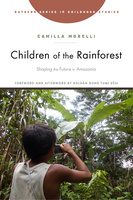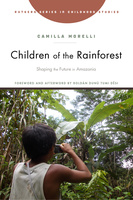Producing Children
Critical Studies in Childhood Creativity
Children’s culture is not only culture for children; it’s culture by children — yet scholars of children’s culture overwhelmingly center work by adults for children. Producing Children acknowledges and theorizes children as cultural producers, underscoring how such creativity empowers children as active participants in their own culture, and helps us to reconceive our understandings of children themselves.
Producing Children
Critical Studies in Childhood Creativity
Children’s culture is not only culture for children; it’s culture by children — yet scholars of children’s culture overwhelmingly center work by adults for children. Producing Children acknowledges and theorizes children as cultural producers, underscoring how such creativity empowers children as active participants in their own culture, and helps us to reconceive our understandings of children themselves.
Children as Social Butterflies
Navigating Belonging in a Diverse Swiss Kindergarten
Children as Social Butterflies offers an analysis of how children negotiate social belonging. Ursina Jaeger followed the children of a kindergarten class in a stigmatized and diverse neighborhood for several years, both inside and outside of school. Along with giving vivid insights into the children's everyday lives, she examines how social differentiation is learned in diverse societies.
Care and Agency
The Andean Community through the Eyes of Children
This book describes the lives of children in rural communities of the Andes Mountains of Peru. It foregrounds the children’s own perceptions and feelings, so far as they can be known by researchers using ethnographic methods. It shows the great variety of Andean childhoods – some happy, others harsh and demanding – and suggests the options children face: follow the many to migrate to the city or risk their hopes on a better future in the rural setting.
China's Left-Behind Children
Caretaking, Parenting, and Struggles
The Farm & Wilderness Summer Camps
Progressive Ideals in the Twentieth Century
Between Self and Community
Children’s Personhood in a Globalized South Korea
Children of the Rainforest
Shaping the Future in Amazonia
Children of the Rainforest
Shaping the Future in Amazonia
When Are You Coming Home?
How Young Children Cope When Parents Go to Jail
Global Child
Children and Families Affected by War, Displacement, and Migration
A World of Many
Ontology and Child Development among the Maya of Southern Mexico
Playing with History
American Identities and Children’s Consumer Culture
Life in a Cambodian Orphanage
A Childhood Journey for New Opportunities
Disputing Discipline
Child Protection, Punishment, and Piety in Zanzibar Schools
Belonging and Becoming in a Multicultural World
Refugee Youth and the Pursuit of Identity
The Queer Aesthetics of Childhood
Asymmetries of Innocence and the Cultural Politics of Child Development
All Together Now
American Holiday Symbolism Among Children and Adults
Weighty Problems
Embodied Inequality at a Children’s Weight Loss Camp
Weighty Problems
Embodied Inequality at a Children's Weight Loss Camp
Visual Encounters in the Study of Rural Childhoods
Complicated Lives
Girls, Parents, Drugs, and Juvenile Justice
Race among Friends
Exploring Race at a Suburban School
Producing Excellence
The Making of Virtuosos
The War of My Generation
Youth Culture and the War on Terror
Childhood in a Sri Lankan Village
Shaping Hierarchy and Desire
Kids in the Middle
How Children of Immigrants Negotiate Community Interactions for Their Families
Defining Student Success
The Role of School and Culture
Defining Student Success
The Role of School and Culture
Life on the Malecón
Children and Youth on the Streets of Santo Domingo
Life on the Malecón is a narrative ethnography of the lives of street children and youth living in Santo Domingo, Dominican Republic, and the non-governmental organizations that provide social services for them. Writing from the perspective of an anthropologist working as a street educator with a child welfare organization, Jon M. Wolseth follows the intersecting lives of children, the institutions they come into contact with, and the relationships they have with each other, their families, and organization workers.
Children of the Occupation
Japan's Untold Story
Following World War II, the Allied Powers occupied Japan from 1945 to 1952, leaving thousands of children of Japanese mothers fathered by men from Australia, the United States, New Zealand, India, and Britain. These mixed-race offspring, and often their mothers, faced intense discrimination. Based on interviews with or research on 150 konketsuji—a now-taboo word for "mixed-blood" Japanese—journalist Walter Hamilton presents vivid first-person accounts of these adults as they remember their experiences of childhood loss.
Learning Race, Learning Place
Shaping Racial Identities and Ideas in African American Childhoods
Erin N. Winkler uses in-depth interviews with an economically diverse group of African American children and their mothers to reorient the way we look at how children develop their ideas about race. She shows the importance of considering this process from children’s points of view and listening to their interpretations of their experiences. The roles of gender, skin tone, colorblind rhetoric, peers, family, media, school, and, especially, place in developing children’s racial identities and ideas are also examined.
Learning the Hard Way
Masculinity, Place, and the Gender Gap in Education
In Learning the Hard Way, Edward W. Morris explores and analyzes detailed ethnographic data to examine the purported gender gap between boys and girls in educational achievement at two low-income high schools—one rural and predominantly white, the other urban and mostly African American. He explains how race, class, and geographic location combine to influence and complicate the construction of gender identities in high school students and affect the respective academic performance of the students he studied.
Learning the Hard Way
Masculinity, Place, and the Gender Gap in Education
In Learning the Hard Way, Edward W. Morris explores and analyzes detailed ethnographic data to examine the purported gender gap between boys and girls in educational achievement at two low-income high schools—one rural and predominantly white, the other urban and mostly African American. He explains how race, class, and geographic location combine to influence and complicate the construction of gender identities in high school students and affect the respective academic performance of the students he studied.
Their Time Has Come
Youth with Disabilities on the Cusp of Adulthood
Valerie Leiter argues that there are crucial missing links between federal disability policies and youth’s lives. Her argument is based on thorough examination of federal disability policy and interviews with young people with disabilities, their parents, and rehabilitation professionals. Attention is given to the diversity of expectations, the resources available to them, and the impact of federal policy and public and private attitudes on their transition to adulthood.
Raising Your Kids Right
Children's Literature and American Political Conservatism
Highlighting the works of William Bennett, Lynne Cheney, Bill O’Reilly, and others on the American political right, Michelle Ann Abate brings together such diverse fields as cultural studies, literary criticism, political science, childhood studies, brand marketing, and the cult of celebrity. Raising Your Kids Right dispels lingering societal attitudes that narratives for young readers are unworthy of serious political study by examining a variety of texts that offer information, ideology, and even instructions on how to raise kids right, not just figuratively but politically.
Rights and Wrongs of Children's Work
Rights and Wrongs of Children's Work
Raising Your Kids Right
Children's Literature and American Political Conservatism
Highlighting the works of William Bennett, Lynne Cheney, Bill O’Reilly, and others on the American political right, Michelle Ann Abate brings together such diverse fields as cultural studies, literary criticism, political science, childhood studies, brand marketing, and the cult of celebrity. Raising Your Kids Right dispels lingering societal attitudes that narratives for young readers are unworthy of serious political study by examining a variety of texts that offer information, ideology, and even instructions on how to raise kids right, not just figuratively but politically.
Contesting Childhood
Autobiography, Trauma, and Memory
Drawing on trauma and memory studies and theories of authorship and readership, Contesting Childhood offers commentary on the triumphs, trials, and tribulations that have shaped the genre of autobiographical writings about childhood. Douglas examines the content of the narratives and the limits of their representations, as well as some of the ways in which autobiographies of youth have become politically important and influential.
We Fight To Win
Inequality and the Politics of Youth Activism
Translating Childhoods
Immigrant Youth, Language, and Culture
Designing Modern Childhoods
History, Space, and the Material Culture of Children
Growing Girls
The Natural Origins of Girls' Organizations in America
Susan A. Miller explores these girls' organizations that sprung up in the first half of the twentieth century from a socio-historical perspective, showing how the notions of uniform identity, civic duty, "primitive domesticity," and fitness shaped the formation of the modern girl.
Armies of the Young
Child Soldiers in War and Terrorism
Rethinking Childhood
In Rethinking Childhood, twenty contributors, coming from the disciplines of anthropology, government, law, psychology, education, religion, philosophy, and sociology, provide a multidisciplinary view of childhood by listening and understanding the ways children shape their own futures. Topics include education, poverty, family life, divorce, neighborhood life, sports, the internet, and legal status.














































